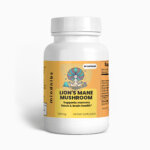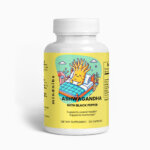
“Autism and ADHD: Exploring the Potential of Supplements”
Autism and ADHD are two neurodevelopmental disorders that affect millions of people worldwide. Although traditional treatments are available, many individuals seek alternatives to improve their symptoms and enhance their quality of life. This has led to an increased interest in supplements as a potential solution to manage the symptoms of both conditions. While the idea of relying on supplements for improvement can raise concerns, recent research has shown promising results in using them as a complementary therapy to more standard treatments. In this article, we will explore the potential of supplements in managing the symptoms of Autism and ADHD and discuss how they can benefit individuals with these conditions.
1. Introduction: Autism and ADHD – A Growing Concern
Autism and Attention Deficit Hyperactivity Disorder (ADHD) are two commonly diagnosed neurodevelopmental disorders affecting millions of individuals worldwide. According to the Centers for Disease Control and Prevention, about 1 in 54 children are diagnosed with autism, whilst 1 in 10 children are diagnosed with ADHD. These numbers are on the rise, causing a growing concern amongst parents, healthcare providers, and policymakers.
Children diagnosed with autism have difficulties in social, communication, and behavioral areas, while those with ADHD have problems concentrating, being still, and organizing their tasks. Both disorders can significantly impact a child’s education, relationships, and overall quality of life. Further complicating these diagnoses is the fact that they often co-occur. Many children with autism also have ADHD, and many children with ADHD also have symptoms of autism.
There is an urgent need for parents, healthcare providers, and policymakers to address the growing concern surrounding these neurodevelopmental disorders. Early detection, diagnosis, and intervention are critical to ensuring that children receive the support and resources they need to thrive. By increasing awareness and understanding of these disorders, we can work together to create a more inclusive and supportive society for all individuals affected by autism and ADHD.

2. Understanding Autism and ADHD: Common Symptoms and Challenges
Autism and ADHD are two common neurodevelopmental disorders that share some symptoms and challenges. Understanding the similarities and differences between them can help families, caregivers, educators, and health professionals provide better support, advice, and treatments for people with these conditions.
One common symptom of autism and ADHD is difficulty with social interaction and communication. Individuals with autism may struggle to read social cues, express emotions, or make friends, while those with ADHD may interrupt conversations, speak impulsively, or have trouble following instructions. Both conditions can also impact attention, memory, planning, and organization, leading to forgetfulness, distractibility, procrastination, and poor academic performance.
Another challenge of autism and ADHD is the stigma and misunderstanding surrounding them. Many people still believe that these conditions are just excuses for bad behavior, laziness, or lack of discipline, when in fact they are real and complex disorders that require empathy, patience, and knowledge to manage effectively. By educating ourselves and others about the nature and impact of autism and ADHD, we can promote acceptance, inclusion, and respect for all individuals, regardless of their neurological differences.
- Some common symptoms of autism are:
- Social communication challenges
- Repetitive behaviors or interests
- Sensory issues or sensitivities
- Delayed or atypical development
- Some common symptoms of ADHD are:
- Inattention or distractibility
- Hyperactivity or impulsivity
- Disorganization or forgetfulness
- Difficulty with time management or planning
Overall, understanding autism and ADHD is crucial for building a more inclusive and compassionate society. By recognizing the common symptoms and challenges of these conditions, we can provide more appropriate and effective support for individuals with autism, ADHD, and other neurological differences. Let us embrace diversity and celebrate the unique strengths and talents of all individuals, regardless of their diagnoses.
3. The Role of Nutritional Deficiencies in Autism and ADHD
Children with autism and ADHD often exhibit symptoms of nutritional deficiencies. Studies have shown that many children with autism have low levels of vitamins, minerals, and essential fatty acids. These deficiencies can affect brain function and can contribute to the hyperactivity, impulsiveness, and lack of focus associated with ADHD.
- Vitamin D: Children with autism and ADHD are often deficient in vitamin D. Vitamin D is important for brain development and function, and low levels can contribute to cognitive and behavioral problems.
- Zinc: Low levels of zinc have been linked to ADHD and can contribute to inattentiveness and hyperactivity. Zinc is important for brain function and helps to regulate dopamine, a neurotransmitter that is essential for attention and motivation.
- Fatty acids: Omega-3 and omega-6 fatty acids are important for brain development and function. Children with autism and ADHD often have low levels of these essential fatty acids, which can contribute to symptoms such as hyperactivity and impulsiveness.
It’s important to ensure that children with autism and ADHD are getting the nutrients they need to support their brain function and overall health. This can be done through a balanced diet, as well as supplementation if necessary. Working with a healthcare provider or registered dietitian can help to identify any nutritional deficiencies and develop a plan to address them.

4. The Benefits of Supplements for Autism and ADHD: A Comprehensive Review
Supplements have become increasingly popular in recent years for their ability to enhance focus and cognitive function. For individuals with autism and ADHD, supplements can provide an additional layer of support in managing symptoms and improving overall quality of life. Here are some of the top benefits of using supplements for autism and ADHD:
– Improved neurodevelopment: Supplements such as omega-3 fatty acids and vitamin D have been shown to support healthy brain growth and development, which is especially important for individuals with autism and ADHD who may have a higher risk of developmental delays or cognitive impairment.
– Eased hyperactivity: Many natural supplements, such as magnesium and iron, have been found to have a calming effect on the nervous system and can help reduce hyperactivity in children with ADHD or autism.
– Enhanced mood and cognitive function: Other supplements, such as zinc and B vitamins, are known to improve mood and cognitive function, which can greatly benefit individuals with autism and ADHD who may struggle with anxiety, depression, or executive function difficulties.
It’s important to note that while supplements can provide numerous benefits for individuals with autism and ADHD, they should not be used as a sole treatment method. Rather, supplements should be used in conjunction with other evidence-based treatments, such as behavior therapy or medication, to support overall health and well-being. Always consult with a healthcare professional before starting any new supplements or treatment regimens.
5. Top Supplements for Managing Autism and ADHD Symptoms
Autism and ADHD are neurological conditions that can affect a child’s physical, mental, and emotional development. Children with these conditions may experience difficulties with communication, social interactions, emotional regulation, and sensory processing. While there is no known cure for autism and ADHD, managing the symptoms is possible with the help of supplements.
1. Omega-3 Fatty Acids: Omega-3 fatty acids, found in fish oil and algae supplements, are essential for brain development and function. Research has shown that children with autism and ADHD may have low levels of omega-3 fatty acids. Supplementation with omega-3 has been shown to improve cognitive and behavioral functioning, reduce hyperactivity and impulsivity, and improve attention and social skills.
2. Probiotics: Probiotics are healthy bacteria that live in our intestines and help support our immune system and digestive health. Studies have shown that children with autism and ADHD may have an imbalance of gut bacteria, which can affect their behavior and cognitive function. Supplementing with probiotics can help restore a healthy gut microbiome and improve symptoms such as irritability, anxiety, and digestive issues.
3. Vitamin D: Vitamin D is an essential nutrient that plays a crucial role in bone health, immune function, and brain development. Research suggests that children with autism and ADHD may have low levels of vitamin D, which can affect their cognitive and behavioral functioning. Supplementing with vitamin D has been shown to improve symptoms such as inattention and hyperactivity, and improve overall mood and behavior.
In conclusion, while managing the symptoms of autism and ADHD can be challenging, it is possible with the right support. Incorporating these top supplements into your child’s daily routine can help improve their cognitive, behavioral, and emotional functioning, and support their overall well-being. Always consult with your child’s healthcare provider before starting any new supplement regimen.
6. Risks and Precautions: What You Need to Know Before Using Supplements
Supplements are a great way to boost your health and wellness, but it is crucial to understand that they come with potential risks and precautions. Before you start taking any supplement, it is important to consult with your doctor or a licensed healthcare professional to determine if it is safe and appropriate for you. Here are some risks and precautions you need to know:
- Possible Interactions: Supplements can interact with prescription medication, over-the-counter drugs, and other supplements. For example, taking vitamin E with blood-thinning medication can increase the risk of bleeding. Always inform your doctor about all the supplements you are taking.
- Side Effects: Supplements can cause side effects, especially when taken in high doses. For instance, taking too much vitamin D can lead to toxicity and hypercalcemia. Always follow the recommended dosage on the supplement label, and do not take more than the recommended amount.
- Poor Quality: Not all supplement manufacturers follow strict quality control standards. Some supplements may contain contaminants, fillers, or inaccurate labeling. To ensure the quality and safety of a supplement, choose products that have been independently tested and certified by third-party organizations like US Pharmacopeia (USP) or NSF International.
Supplements can be a valuable addition to your health routine, but you need to approach them with caution. Before taking any supplement, do your research, read the label, and consult with a healthcare professional. By doing so, you can minimize the risks and maximize the health benefits of supplements.
7. Conclusion: Unlocking the Potential of Supplements for a Better Life with Autism and ADHD
After examining the research on the use of supplements for autism and ADHD, it is clear that there is great potential for improving quality of life in those with these conditions. It is important to note that supplements should not be used as a replacement for medication or therapy, but rather as a complementary approach to treatment. Considering the low risk of adverse effects for many supplements, they are worth exploring as an additional tool in managing autism and ADHD symptoms.
One of the most promising supplements for autism and ADHD is Omega-3 fatty acids. These have been found to improve attention and behavior in children with ADHD. Additionally, some studies have shown that magnesium and vitamin B6 supplementation can improve behavior in children with autism. Other supplements that may be helpful include iron, zinc, and probiotics, among others.
It is important to consult with a healthcare professional before starting any supplement regimen for autism or ADHD. They can help determine which supplements may be appropriate based on an individual’s specific needs and provide guidance on dosage and potential interactions with other medications. With careful consideration and proper use, supplements may provide an additional avenue for individuals with autism and ADHD to unlock their full potential and lead a better quality of life.
In conclusion, although there is no single cure for autism and ADHD, there is considerable potential in supplementing with vitamins and minerals, such as zinc, magnesium, and omega-3s. These supplements have been proven to help improve cognitive and physical symptoms, and may even benefit social and emotional behaviors. Additionally, research is continuing, and new discoveries are made every day. With more research, the potential of supplementing with vitamins and minerals for healing autism and ADHD may become more widely accepted in the future.

























